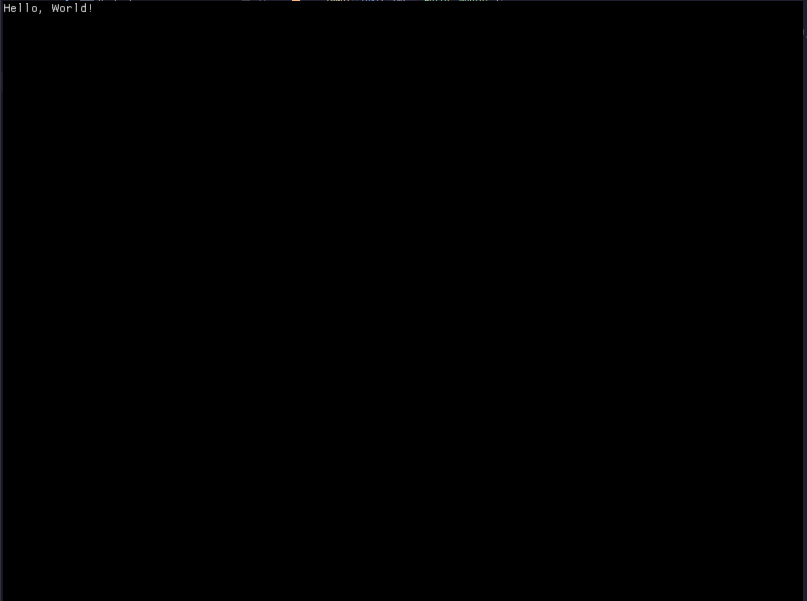-
-
Notifications
You must be signed in to change notification settings - Fork 4
Init Info
The InitInfo struct in the Instance.hpp header is responsible for data needed to initialise the framework.
The members of the struct can be seen below:
struct InitInfo
{
std::vector<InlineComponent*> inlineComponents;
std::vector<TitlebarComponent*> titlebarComponents;
std::vector<WindowComponent*> windowComponents;
// Provide a global data struct to be shared with all components
void* globalData = nullptr;
bool bGlobalAllocatedOnHeap = true; // Set this to false if the global is a stack pointer
UImGui_CInitInfo* cInitInfo = nullptr;
FString frameworkLibraryDir;
FString applicationDir;
FString applicationLibraryDir;
FString configDir;
FString projectDir;
FString contentDir;
FString frameworkIncludeDir;
FString applicationIncludeDir;
};The 3 arrays contain generic pointers to the different components that should be rendered.
The globalData void pointer contains data that you can fetch on demand in any component by calling
UImGui::Instance::getGlobal().
When cleaning up the globalData, we will automatically default to calling free on it. If the pointer is stack
allocated, however, this will result in a segmentation fault. For that reason, you need to set
bGlobalAllocatedOnHeap to false.
The cInitInfo variable is explained in the
C API section.
The following members of the InitInfo struct are used to access framework configuration and resource files:
FString frameworkLibraryDir;
FString applicationDir;
FString applicationLibraryDir;
FString configDir;
FString projectDir;
FString contentDir;
FString frameworkIncludeDir;
FString applicationIncludeDir;When an instance is generated from the UVKBuildTool, the constructor contains the following code, which initialises
the variables above:
MyProject::Instance::Instance()
{
initInfo =
{
UIMGUI_INIT_INFO_DEFAULT_DIRS,
};
}This macro and other directory macros can be found under the Generated/Config.hpp file, which looks like this:
#pragma once
// Default defines for these directories. They will only be defined while compiling for production
#ifndef UIMGUI_FRAMEWORK_LIBRARY_DIR
#define UIMGUI_FRAMEWORK_LIBRARY_DIR "."
#endif
#ifndef UIMGUI_APPLICATION_DIR
#define UIMGUI_APPLICATION_DIR "."
#endif
#ifndef UIMGUI_APPLICATION_LIBRARY_DIR
#define UIMGUI_APPLICATION_LIBRARY_DIR "."
#endif
#ifndef UIMGUI_CONFIG_DIR
#define UIMGUI_CONFIG_DIR "../Config/"
#define UIMGUI_PROJECT_DIR "../"
#endif
#ifndef UIMGUI_CONTENT_DIR
#define UIMGUI_CONTENT_DIR "../Content/"
#endif
#ifndef UIMGUI_FRAMEWORK_INCLUDE_DIR
#define UIMGUI_FRAMEWORK_INCLUDE_DIR "../Framework/"
#endif
#ifndef UIMGUI_APPLICATION_INCLUDE_DIR
#define UIMGUI_APPLICATION_INCLUDE_DIR "../Source/"
#endif
#define UIMGUI_INIT_INFO_DEFAULT_DIRS \
.frameworkLibraryDir = UIMGUI_FRAMEWORK_LIBRARY_DIR, \
.applicationDir = UIMGUI_APPLICATION_DIR, \
.applicationLibraryDir = UIMGUI_APPLICATION_LIBRARY_DIR, \
.configDir = UIMGUI_CONFIG_DIR, \
.projectDir = UIMGUI_PROJECT_DIR, \
.contentDir = UIMGUI_CONTENT_DIR, \
.frameworkIncludeDir = UIMGUI_FRAMEWORK_INCLUDE_DIR, \
.applicationIncludeDir = UIMGUI_APPLICATION_INCLUDE_DIR
When compiling for production, these compiler definitions change to the prefix and configuration in the uvproj.yaml
file. More on production deployment
here.
2 entries ago, we started a hello world application, but we still haven't initialised it yet. Let's render that text!
Enter your Instance.hpp file under Source. It should look like this:
#pragma once
#include <Framework.hpp>
namespace UntitledTextEditor
{
class UIMGUI_PUBLIC_API Instance : public UImGui::Instance
{
public:
Instance();
virtual void begin() override;
virtual void tick(float deltaTime) override;
virtual void end() override;
virtual ~Instance() override;
virtual void onEventConfigureStyle(ImGuiStyle& style, ImGuiIO& io) override;
private:
};
}First, include the hello.hpp file above and create an instance of the hello class as a member variable.
In your Instance.cpp file, all you need to do is modify the InitInfo. Simply put this line into your constructor
so that it looks like this:
UntitledTextEditor::Instance::Instance()
{
initInfo.inlineComponents = { &hello };
}And run your application. We have a hello world message!

The entire module is flagged as event safe at Any time.
The C++ version of InitInfo contains a pointer to a struct of type UImGui_CInitInfo, which is the C API version of
the InitInfo struct. The 2 structs are completely separate and are not replaced by one another at any point.
The UImGui_CInitInfo struct looks like this:
typedef struct UImGui_CInitInfo
{
UImGui_CComponentHandle* inlineComponents;
size_t inlineComponentsSize;
UImGui_CComponentHandle* titlebarComponents;
size_t titlebarComponentsSize;
UImGui_CComponentHandle* windowComponents;
size_t windowComponentsSize;
UImGui_CInstanceRegularFun* constructFuncs;
size_t constructSize;
UImGui_CInstanceRegularFun* beginFuncs;
size_t beginSize;
UImGui_CInstanceTickFun* tickFuncs;
size_t tickSize;
UImGui_CInstanceRegularFun* endFuncs;
size_t endSize;
UImGui_CInstanceRegularFun* destructFuncs;
size_t destructSize;
void* globalData;
bool bGlobalAllocatedOnHeap;
} UImGui_CInitInfo;Here there are the familiar 3 events, which store C component handles. Additionally, there are the 2 variables
related to global data, globalData and bGlobalAllocatedOnHeap, which are separate from their C++ equivalents.
Finally, there are the Instance events, which can be used to bind to the global instance's events.
They are the following:
-
constructFuncs- Called in the constructor -
beginFuncs- Called on begin event -
tickFuncs- Called on tick event -
endFuncs- Called on end event -
destructFuncs- Called in the destructor
These events are of type UImGui_CInstanceRegularFun, which expands to void(*)(UImGui_CInitInfo*),
except for tickFuncs, which is of type UImGui_CInstanceTickFun, which expands to void(*)(UImGui_CInitInfo*, float).
All arrays, have their according size variables of type size_t, which must be set correctly.
There are 3 functions that can be used to interact with the C Instance and InitInfo API:
-
UImGui_Instance_setCInitInfo- given a pointer to aUImGui_CInitInfostruct, it sets the C init info -
UImGui_Instance_getCppInitInfoGlobalData- Returns the global data pointer from the C++ side, given a pointer to aboolthat will be populated with the C++ value ofbGlobalAllocatedOnHeap -
UImGui_Instance_getCLIArguments- Returns the array of CLI arguments of typechar**, given a pointer to anint, which will be set to the number of arguments. - The rest - Returns a
UImGui_Stringpointing to the directory strings in the C++InitInfostruct
This project is supported by all the people who joined our discord server and became beta testers. If you want to join the discord you can click here.
- Home
- Beginner content
- Install guide
- Creating and using the UI components
- The Instance
- The Init Info struct
- Textures
- Logging
- Unicode support
- Additional features
- Client-side bar
- Custom type definitions
- Memory management
- C API development
- Config files and Folders
- Interfaces
- Internal Event safety
- Customising the build system
- Modules system
- Collaborating with others
- Advanced content
- Developer and contributor resources
- Misc